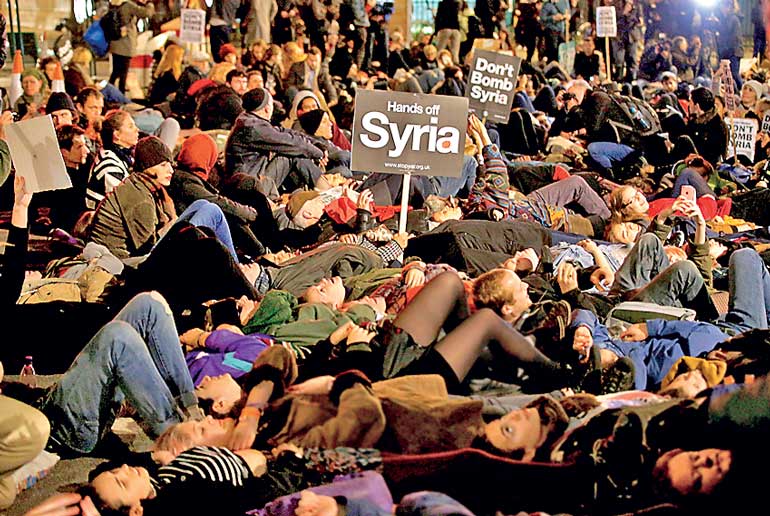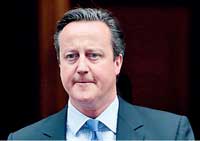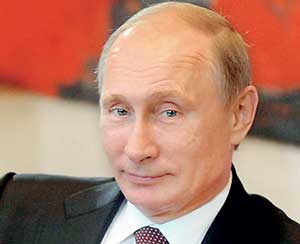Sunday Feb 22, 2026
Sunday Feb 22, 2026
Friday, 4 December 2015 00:00 - - {{hitsCtrl.values.hits}}

Anti-war protestors block the road during a demonstration outside the Houses of Parliament in London, Britain, December 2, 2015. REUTERS
Reuters: Britain’s Parliament voted on Wednesday (December 2) to launch bombing raids against Islamic State in Syria, supporting Prime Minister David Cameron’s case that the country needs to help destroy militants who are “plotting to kill us.”
After more than 10 hours of tense debate, lawmakers voted in favour of air strikes, by 397 to 223. British Tornado GR4 bombers could leave an air base in Cyprus within hours to launch the country’s latest military action in the Middle East.
Given Britain’s diminished role on the world stage, the victory hands Cameron the chance to restore Britain’s standing in global affairs. He had urged lawmakers not to turn their back on allies such as France in their time of need.
Many British voters are wary of being dragged into another war in the Middle East. Some view Western intervention in Iraq and Libya as a failure that sowed chaos across the region and the news of the vote was met by howls of disgust by dozens of anti-war protesters demonstrating outside parliament.
But the 13 November attacks on Paris that killed 130 people and were claimed by Islamic State have stiffened the resolve of some lawmakers and divided the opposition Labour Party, which convinced Cameron he could win the support of Parliament for extending air strikes beyond Iraq.
Cameron said the more than four-year Syrian civil war could not be resolved by military action alone, but that the strikes would “degrade” Islamic State militants - which he said should be called Daesh.
Daesh is the pejorative word used by opponents or people who do not support Islamic State to refer to the jihadist group. It is the Arabic acronym of Islamic State’s previous name “Islamic State of Iraq and Levant” (ISIL).
Germany’s parliament is also expected to vote on Friday in favour of joining the campaign against Islamic State, although only to provide military support for air strikes, not actually to take part in them.
British air strikes are unlikely to change the military balance, given the United States is already involved, but the vote handed Cameron the chance to show Britain’s willingness to add to a Western consensus for taking the battle to militants in Syria.
Cameron said high-precision, laser-guided Brimstone missiles would help to make a real difference by hitting the de facto Islamic State capital of Raqqa and its oil-trading business.
France and the United States are already bombing Islamist militants in Syria, while Russia has bombed mainly other rebels, according to conflict monitors and Western officials, in an intervention launched on 30 September to bolster its ally, Syrian President Bashar al-Assad. The West says Assad must go.
The vote also boosts Cameron after he suffered a humiliating 2013 parliamentary defeat over plans to bomb Assad’s forces.
But it is a blow to the leader of Britain’s main opposition Labour Party, Jeremy Corbyn, who was against launching the air strikes.
Corbyn, a veteran anti-war campaigner who argued the bombing would be ineffective and kill civilians, was forced to allow his lawmakers to vote according to their conscience in order to quell a rebellion in his party over the military action.
Corbyn had hoped media reports that Cameron told Conservative lawmakers at a meeting late on Tuesday not to vote with the Labour leader “and a bunch of terrorist sympathisers” would harden opposition to the action.
The British public is divided over launching the strikes, with a YouGov opinion poll showing voter support for action in Syria had fallen to the lowest level since September 2014, with 48 percent of respondents supporting strikes and 31 percent against.

MOSCOW (Reuters): Turkey will regret “more than once” about its shooting down of a Russian bomber jet near the Syrian-Turkish border, Russian President Vladimir Putin said on Thursday, adding Moscow would not ignore Ankara’s “aiding of terrorists”.
In a reference clearly aimed at the West, Putin said in his annual state of the nation address that countries “should not apply double standards on terror” or use terrorist groups for their own needs.